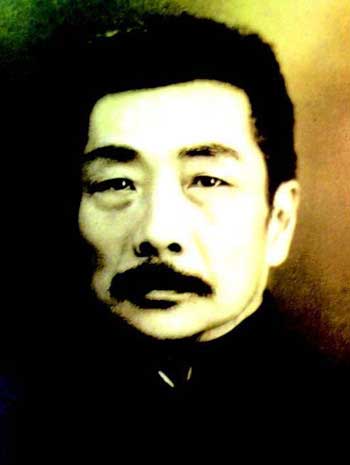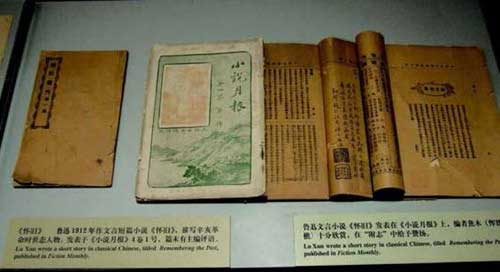- +86-13267351235
- info@globalstourtravels.com
Lu Xun, with the original name of Zhou Shuren, was born in a declining scholar-bureaucrat's family. "Lu Xun" is the pen name used by him for the first vernacular novel A Madman s Diary published by him. In his youth, he studied in an old-style private school, took an imperial examination, and was well grounded in traditional culture. In 1898, he left home to pursue new learning in Nanjing and other places. From 1902 to 1909, he studied in Japan. In this period, he increasingly realized that it was more important to cure Chinese people's spiritual ills rather than their physical diseases, so he abandoned his medical career and selected literature as his path of saving Chinese people's spirit.

Lu Xun
Lu Xun published China's first modern vernacular novel A Madman s Diary in New Youth in May 1918, later published more than ten novels including Kong Yiji, Medicine and The True Story of Ah Q successively, and published the collection Call to Arms in 1923, These works revealed the actual achievements of the literary revolution, deeply shook young intellectuals pursuing progress then, and laid a foundation for the development of Chinese modern novels with thorough and profound anti-feudal thoughts and novel and mature artistic forms. Later, Lu Xun successively created and published the novel collection Wandering, the lyric prose collection Wild Grass, the narrative prose collection Dawn Blossoms Plucked at Dusk, the historical novel collection Old Tales Retold and more than ten essay collections. All of Lu Xun's literary creations and literary activities were for one lofty goal, i.e. reforming Chinese people's spirit and saving the destiny of the nation. It was the origin of the greatness and profoundness of Lu Xun's works and his thoughts. In October 1936, Lu Xun died of illness in Shanghai. His coffin was covered by a flag sewn with the words "National Soul."
A Madman s Diary is the first vernacular novel written by Lu Xun and the first short novel in the true modern sense in the history of new literature. Through the method of combining reality and symbols, the novel reveals profound contents at three levels through the madman's stream of
consciousness: first, seeing through the madman's eyes that China's history of thousands of years was "man-eating" history; second; showing through the madman's feelings that man-eating existed not only in history, but also in reality; third, shouting "save the children" through the madman's mouth and expressing future expectations. The image of the "madman" is not only vivid, but also of special symbolic significance. He is a symbol of the group of advanced intellectuals including Lu Xun who awakened earliest during the "May 4th" Movement.

The True Story of Ah Q was first published in the Beijing Morning News supplement as a serial from December 1921 to February 1922.
The protagonist in the novel Ah Q lives in Wei Village, a village in the middle and lower reaches of the Yangtze River suffering deep social conflicts during the Revolution of 1911. He is a very poor vagrant farmhand with no home, no job, no relative and no friend, making a living by doing short-term work for others. People in Wei Village do not give attention to Ah Q normally, and only remember this cheap laborer when they are busy. Ah Q's social status is very low. He even does not know his family name. Once he says he is a namesake of landlord Zhao after drinking two cups of yellow wine, and landlord Zhao sends a town crier to summon him, slaps him in the face and prohibits him from having the surname Zhao. Ah Q's spirit and character are ridiculed and harmed by people from time to time. However, such a humiliated and harmed person seems to have no real worry himself and, to the contrary, leads a life of ease and leisure. This is because Ah Q is restricted by a horrible spiritual shackle, which is the "spiritual victory method:" whenever he is humiliated in life, he comforts himself with "witty remarks" such as "who do you think you are anyway" and "it is as if I were beaten by my son," "defeats" his enemy in imagination, and eliminates humiliation through self-deception to get comfort; he is excessively concerned about face-saving, dare not directly face his weaknesses and shortcomings, and considers it "a great loss of face" to have less lice than Whiskers Wang; he bullies kindhearted people and fears evil people. He dare not fight after landlord Zhao slaps him in the face and after the Imitation Foreign Devil beats him with a mourner's stick, but he retaliates against weak ones. His teasing of a young nun and his fighting with Whiskers Wang and Young D are typical manifestations. Besides, Ah Q is also very numb and forgetful. No matter how greatly he is humiliated, he can, after obtaining "spiritual victory," make his way cheerfully to the wine shop to drink a few bowls of wine, joke with the others again, and return cheerfully to the temple he lives in, there to fall asleep as soon as his head touched the pillow.
Ah Q's "spiritual victory method" was a social mental morbidity. Lu Xun's analysis of it was intended to criticize the whole old society. Lu Xun said many times that the actual purpose of shaping the image of Ah Q was to depict Chinese people's souls and save the nation's destiny. Ah Q was "the soul of modern Chinese people." Ah Q's tragic fate shows in depth: only through powerful ideological enlightenment and thorough elimination of Chinese people's spiritual shackles could China's democratic revolution have bright prospects.
The artistic achievements of The True Story of Ah Q are reflected in many aspects. First, artistic descriptions are very typical. The novel adopts the typical character shaping method of "combing several characters into one," showing a high degree of generality. The novel purposefully downplays the characteristics of Ah Q's status, describes him as a link between various social classes and even between urban and rural areas, and thus enhances the general applicability of the "Ah Q mentality" to Chinese people of that period. Wei Village can also be regarded as an epitome of ancient China. Such an environment provides appropriate soil for the emergence and development of Ah Q's "spiritual victory method." The "spiritual victory method" was quite universal in that period, but its manifestation on the vagrant farmhand Ah Q has its particularities. This shows Ah Q under Lu Xun's pen is a highly individualized typical backward peasant deeply poisoned by feudal thoughts instead of an embodiment of abstract concepts. Second, detail descriptions are spectacular and vivid. For example, the lighting of lamps in the Zhao family is described in different paragraphs, reflecting landlord Zhao's stingy personality in greater depths and making this character lifelike. Third, it has strong critical and satirical characteristics. Argumentative elements are interested into many parts of the novel. These humorous and incisive arguments give strong ideological and critical color to the work. Fourth, the novel contains accurate, clear, vivid and concise words with a strong sense of humor, and uses many ironies and exaggerations, showing Lu Xun's outstanding linguistic talent.
The True Story of Ah Q with its profound thoughts and great artistic achievements has become a classic among Chinese modern literary creations.